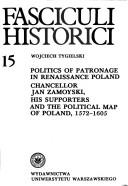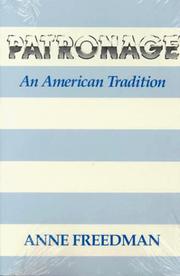| Listing 1 - 10 of 224 | << page >> |
Sort by
|
Book
ISBN: 1412354625 Year: 2006 Publisher: Chicoutimi : J.-M. Tremblay,
Abstract | Keywords | Export | Availability | Bookmark
 Loading...
Loading...Choose an application
- Reference Manager
- EndNote
- RefWorks (Direct export to RefWorks)
Book
ISBN: 1412356733 Year: 2007 Publisher: Chicoutimi : J.-M. Tremblay,
Abstract | Keywords | Export | Availability | Bookmark
 Loading...
Loading...Choose an application
- Reference Manager
- EndNote
- RefWorks (Direct export to RefWorks)

ISBN: 8323003211 Year: 1990 Publisher: Warszawa : Wydawnictwa uniwersytetu Warszawskiego,
Abstract | Keywords | Export | Availability | Bookmark
 Loading...
Loading...Choose an application
- Reference Manager
- EndNote
- RefWorks (Direct export to RefWorks)
Book
ISBN: 9780199599370 0199599378 Year: 2012 Publisher: Oxford : Oxford University Press,
Abstract | Keywords | Export | Availability | Bookmark
 Loading...
Loading...Choose an application
- Reference Manager
- EndNote
- RefWorks (Direct export to RefWorks)
Book
Year: 1690 Publisher: [Edinburgh : printed by the heir of Andrew Anderson, printer to Their most Excellent Majesties,
Abstract | Keywords | Export | Availability | Bookmark
 Loading...
Loading...Choose an application
- Reference Manager
- EndNote
- RefWorks (Direct export to RefWorks)
eebo-0018
Book
Year: 2023 Publisher: Washington, DC : World Bank,
Abstract | Keywords | Export | Availability | Bookmark
 Loading...
Loading...Choose an application
- Reference Manager
- EndNote
- RefWorks (Direct export to RefWorks)
This paper proposes a preliminary economic model of political clientelism and corruption in developing countries with weak rule of law. It explains why this corruption is often chronic and persistent, and further examines its impact on fragility, conflict, and violence. The basic model is built in three stages: (i) political party strategies vis-a-vis clientelist options using a game-theoretical approach, (ii) strategies of using state repression and violence to complement electoral clientelism, and (iii) strategies of geographical/ethnic entities on remaining within a given republic or breaking away. The model predicts that the first clientelist party in power can monopolize government for long periods and further consolidate power by blending in state violence. Political clientelism and corruption are likely to provoke geographically distinct communities and movements to challenge the sovereignty and territorial integrity of the country concerned. The impact on fragility is predicted as greatest during monopolistic and dictatorial clientelism. Governance structures of inegalitarian or unjust local traditional authorities are shown to be an important independent factor provoking separatism. Separatist movements are predicted to be left leaning or egalitarian in the beginning of their struggle. As economies grow and shift away from a patronage-based private sector toward a productive one, individuals are likely to be protective of their enterprises and incomes against the aleatory decisions of a clientelist government. Therefore, a substantially enhanced investment in a productive private sector may likely be a better longer term anti-corruption strategy than exclusively focusing on governance, accountability, and accounting measures.
Book
ISBN: 213063737X 9782130644972 213064497X 9782130637370 Year: 1998 Publisher: Paris (6, avenue Reille 75685) : P.U.F.,
Abstract | Keywords | Export | Availability | Bookmark
 Loading...
Loading...Choose an application
- Reference Manager
- EndNote
- RefWorks (Direct export to RefWorks)
Patronage, Political. --- Patronage, Political --- Political corruption
Book
Year: 1989 Publisher: Paris: Association française pour l'étude de la Méditerranée orientale et du monde turco-iranien,
Abstract | Keywords | Export | Availability | Bookmark
 Loading...
Loading...Choose an application
- Reference Manager
- EndNote
- RefWorks (Direct export to RefWorks)

ISBN: 0830412875 Year: 1994 Publisher: Chicago Nelson-Hall
Abstract | Keywords | Export | Availability | Bookmark
 Loading...
Loading...Choose an application
- Reference Manager
- EndNote
- RefWorks (Direct export to RefWorks)
Book
ISBN: 1920655816 9781920655815 9781920655822 1920655824 1920655808 9781920655808 Year: 2013 Publisher: Newtown, Johannesburg : Real African Publishers,
Abstract | Keywords | Export | Availability | Bookmark
 Loading...
Loading...Choose an application
- Reference Manager
- EndNote
- RefWorks (Direct export to RefWorks)
Patronage Politics Divides Us: A Study of Poverty, Patronage and Inequality in South Africa is the culmination of a research project that forms part of MISTRA's first suite of eight priority research projects. The research explores the relationship between patronage, poverty, and inequality with a particular focus on its impact on the conduct of local politics. The overall aim of the study was to explore the possibility of constituting public institutions in a manner that enables them to become legitimate arbiters between the various interests, rather than as instruments that are captured by c
Patronage, Political --- Poverty --- Equality
| Listing 1 - 10 of 224 | << page >> |
Sort by
|

 Search
Search Feedback
Feedback About UniCat
About UniCat  Help
Help News
News